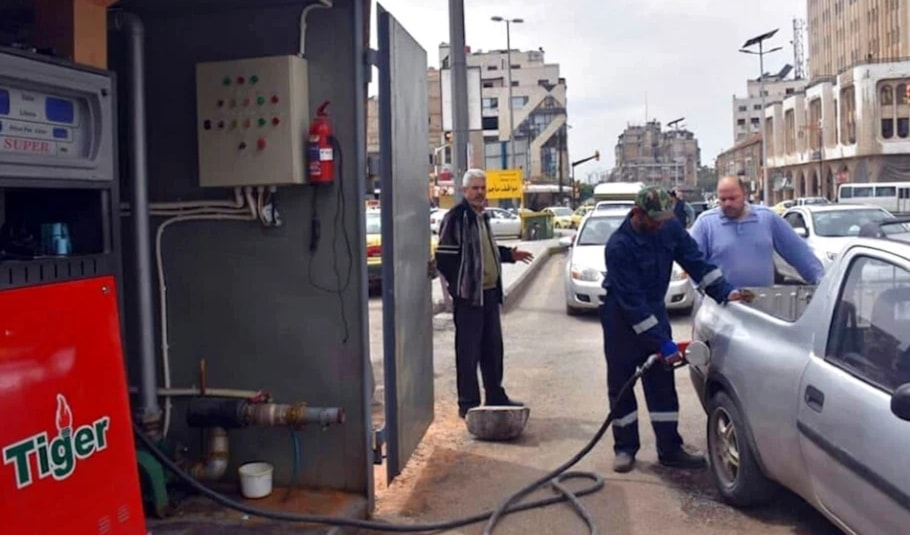Syria resorts to intermediaries for oil imports amid low bids
Syria is turning to local intermediaries for oil imports after major traders avoided its tenders due to sanctions and financial risks, complicating its energy security amid halted Iranian oil deliveries.
-

This file photo released on April 7, 2019, by the Syrian official news agency SANA, shows a worker filling a pickup at a gas station, in Homs, Syria. (SANA)
Syria is now looking to secure oil imports through local intermediaries after its first post-Assad import tenders received little interest from major oil traders due to ongoing sanctions and financial risks, Reuters reported, citing multiple trade sources.
The caretaker government had issued tenders to import 4.2 million barrels of crude oil, along with 100,000 metric tons each of fuel oil and diesel, seeking delivery "as soon as possible," according to copies of the tender documents.
However, the tenders, which closed on Monday, have not been awarded.
The government, as per the report, is now negotiating with local companies to fulfill its energy needs, the sources said. The struggle to secure major fuel suppliers could further exacerbate Syria’s energy security challenges, particularly as Iran appears to have halted its regular oil deliveries.
Major oil traders opted out of the tenders, with sources at the firms citing concerns over sanctions and financial risks. "There is still no clarity on whether the EU sanctions have been lifted. This is also compounded by broader banking issues," a Middle East trader familiar with the tender told Reuters.
Furthermore, the sources noted that payment terms also discouraged potential sellers. These included selling on open credit with delayed repayment and a requirement for sellers to provide a $200,000–500,000 performance bond to a Syrian bank as a guarantee for oil delivery—an uncommon condition in the industry, traders said.
Turkiye eyes role in Syria's energy sector with gas pipeline to Aleppo
Turkiye announced, on Thursday, plans to construct a gas pipeline to Aleppo, Syria, aiming to address the severe energy shortages in the region. Turkish Energy and Natural Resources Minister Alparslan Bayraktar stated on Thursday that the pipeline construction is expected to take 12 to 15 months, while efforts to restore electricity infrastructure, including power lines, will take at least six months.
Aleppo, one of Syria's largest cities, requires around 2,000 MW of electricity, but much of the infrastructure was damaged during the war. Bayraktar outlined a plan to boost electricity supply to northern Syria by 50%, with 500 MW transferred via power lines, while the rest will come from gas-powered plants that require repairs.
"We are planning to increase electricity transferred to northern Syria by 50% ... 500 MW will be transferred via power lines, and the rest will be provided by gas power plants, that need to be repaired. However, the plants need gas, so we are now working on a 50-60 kilometer [31-37 mile] long gas pipeline to Aleppo," CNN Turk quoted Bayraktar as saying.
Energy crisis
Syria has suffered from chronic power shortages due to war-damaged infrastructure and Western sanctions. Many areas rely on diesel generators as power outages remain frequent. The fall of Damascus on December 8 and the subsequent resignation of President Bashar al-Assad, who later fled to Russia, have reshaped the country’s political landscape.
Mohammed al-Bashir, an opposition figure who previously managed an Idlib-based administration, was named interim prime minister. He has since announced the formation of a transitional government, which is expected to remain in place until March 2025.
Additionally, Syria’s largest oil refinery, Baniyas, halted operations in December due to the cessation of crude oil shipments from Iran, the Financial Times reported on December 19. The report noted that Syria's new leadership is exploring alternative suppliers to ease its worsening energy crisis, which could open the door for collaboration with Turkiye.

 4 Min Read
4 Min Read









